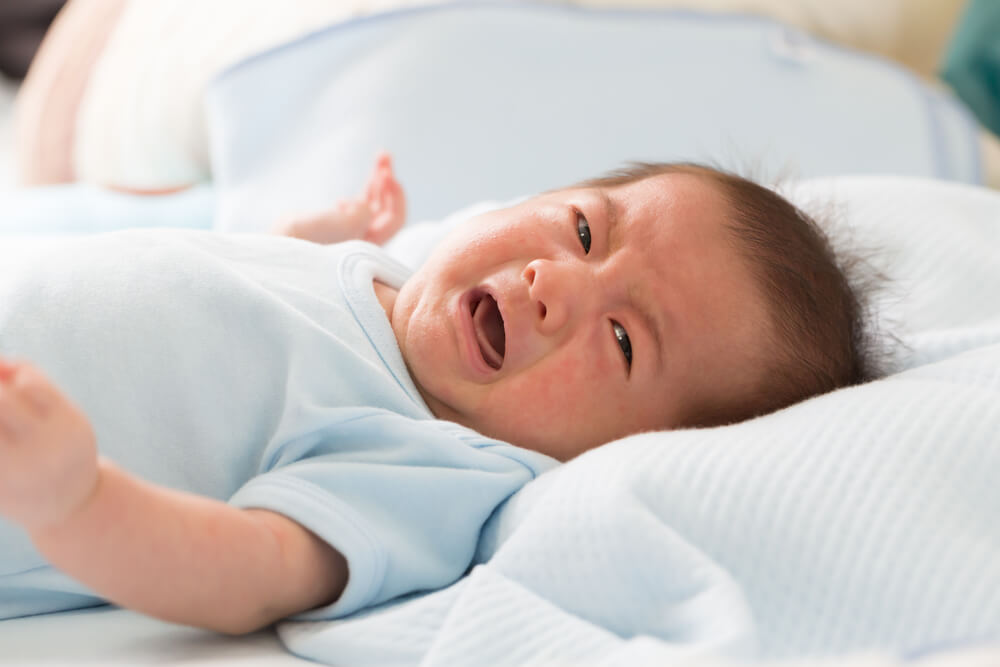Diarrhea in newborns can be a concerning issue for new and seasoned parents alike, as it can lead to dehydration and other health complications. Baby diarrhea is typically characterized by frequent, watery, and loose stools. Diarrhea in newborns can be caused by a variety of factors, including infections, food intolerance, or changes in diet. It is important to seek medical attention if your newborn is experiencing diarrhea, as prompt diagnosis and treatment can help prevent complications and promote a quick recovery. In this article, we will discuss the most common causes, frequent symptoms, and possible treatment options for diarrhea in babies.
On top of that, you will uncover how to relieve constipation in babies quickly. A happy and thriving baby equals happy parents! That said, here is what you must know about infant diarrhea and how to boost your child’s health.
Defining Newborn Diarrhea
As mentioned in the introduction, newborn diarrhea is the passage of frequent, loose, and watery stools in infants. It can be caused by a variety of factors, including infections, food intolerance, or changes in diet, and is a common issue in newborns. If left untreated, newborn diarrhea can lead to dehydration and other health complications, making prompt diagnosis and treatment critical.
Every parent’s first step should be to consult with a trained and experienced medical professional. We recommend reaching out to a medical expert such as Doctor Ana. Taking immediate action is crucial if you want the best results and the most detailed diagnosis.
Most Common Symptoms and Signs of Newborn Diarrhea

Here are the most common signs of baby diarrhea to take into consideration:
- Frequent, loose, and watery stools
- Increased number of bowel movements
- Stools with a more liquid consistency
- Stools that are yellow, green, or brown in color
- Stools that have a strong, foul odor
- Abdominal cramping or discomfort
- Increased fussiness or crying
- Dehydration, indicated by dry mouth, sunken eyes, and decreased urination
If your baby is experiencing any of these symptoms, make sure to seek medical attention as soon as possible. Prompt diagnosis and treatment can help prevent complications and promote a quick recovery.
If you are located in the area, consulting with a pediatrician in Miami, Florida, may be the best option.
What Causes Infant Diarrhea?
Several risk factors can lead to infant diarrhea. Some of the most common include:
- Infections: Bacterial, viral, or parasitic infections can cause diarrhea in infants.
- Food intolerance: Newborns can develop intolerance to certain foods, such as cow’s milk, soy, or gluten, which can cause baby diarrhea.
- Changes in diet: Introducing new foods or formulas can sometimes cause infant diarrhea.
- Antibiotic use: Antibiotics can disrupt the balance of bacteria in the gut and lead to diarrhea.
- Other medical conditions: Certain medical conditions, such as celiac disease or inflammatory bowel disease, can cause diarrhea in infants.
Identifying and addressing the underlying cause of infant diarrhea is essential to treat the condition effectively.
What Does a Healthy Baby’s Poop Look Like?
Normal baby poop can vary in color, consistency, and frequency depending on the baby’s age, diet, and other factors. Here is a general guide to what is considered normal for baby poop:
- Breastfed babies: Breastfed baby poop is typically yellow, runny, and seedy in texture. It may be frequent, with several bowel movements a day, and can have a slightly sweet odor.
- Formula-fed babies: Formula-fed baby poop is typically yellow-brown and thicker than breastfed baby poop. It may have a more pungent odor, and bowel movements may be less frequent.
- Newborns: Newborn baby poop is often black or dark green in color and is referred to as meconium. Meconium is sticky and tarry in texture and will change to a yellow-brown color over the first few days of life.
It is important to note that normal baby poop can vary widely, and what is considered normal for one baby may not be for another. If you have any concerns about your baby’s poop, it is always best to seek advice from your pediatrician.
Can a Milk Allergy Cause Diarrhea in Babies?
Yes, milk allergy can cause diarrhea in babies. Milk allergy is a reaction to the proteins in cow’s milk and can cause digestive symptoms, such as diarrhea, in infants. Other milk allergy symptoms in babies may include vomiting, abdominal pain, bloating, and blood in the stool.
Diarrhea in Babies and Dehydration: How to Spot It
The signs of baby dehydration include:
- Dry mouth and/or tongue
- Sunken eyes
- Urinating less than usual
- Having dry skin
- Feeling irritable or fussy
- Lethargy or feelings of tiredness
- Dizziness or lightheadedness
If your baby is experiencing any of these symptoms, it is vital to seek medical attention as soon as possible. Dehydration can be serious and can cause severe health problems if left untreated. Your pediatrician can help you determine the best way to rehydrate your baby and manage any underlying conditions that may be causing the dehydration.
What Is the Best Treatment for My Baby?
Treatment for baby diarrhea may include:
- Rehydration: Offer your baby frequent, small amounts of clear fluids, such as water, breast milk, or an oral rehydration solution, to replace fluids lost due to diarrhea.
- Diet: If your baby is breastfed, continue to breastfeed as normal. If your baby is formula-fed, consider switching to a lactose-free formula if lactose intolerance is suspected.
- Probiotics: Probiotics may help restore the balance of healthy gut bacteria and reduce diarrhea symptoms.
- Medications: Your pediatrician may prescribe meds like loperamide to slow down diarrhea and control symptoms.
- Avoid food and drinks that may worsen diarrhea, such as cow’s milk, high-sugar drinks, and spicy or fatty foods.
Always seek medical advice before trying to treat your baby at home. Your pediatrician can help you determine the best course of treatment for your baby based on the underlying cause of diarrhea and your baby’s overall health.
Best Foods to Avoid Diarrhea

If your baby is eating solid foods, here is a list of dietary staples to add or avoid.
- Rice cereal: Rice cereal is a bland, easily digestible food that can help to firm up stools and reduce diarrhea.
- Bananas: Bananas are a good source of potassium, which can help to prevent dehydration, and are also easily digestible.
- Applesauce: Applesauce is another bland, easily digestible food that can help reduce diarrhea symptoms.
- Boiled potatoes: Boiled potatoes are a good source of complex carbohydrates and can help to firm up stools and reduce diarrhea.
- Toast or crackers: Toast or crackers can help to absorb excess fluid in the gut and reduce diarrhea.
It’s best to seek medical advice before making significant changes to your baby’s diet.
Here are some tips to help a constipated baby:
- Increase fluid intake: Offer your baby extra water or diluted fruit juice to help soften stools and promote bowel movements.
- Encourage physical activity: Encourage your baby to be physically active to help stimulate their digestive system. This can include tummy time, riding in a stroller, or gentle exercise.
Give Us a Call Now
Don’t wait – take action NOW to ensure your child is healthy. If your baby is experiencing symptoms and signs of diarrhea, it’s important to seek medical attention. Schedule an appointment with our medical experts today.




